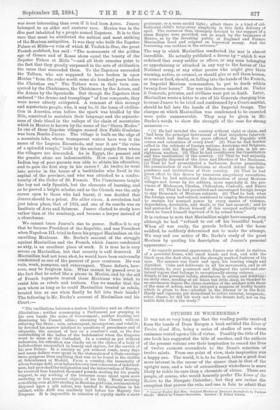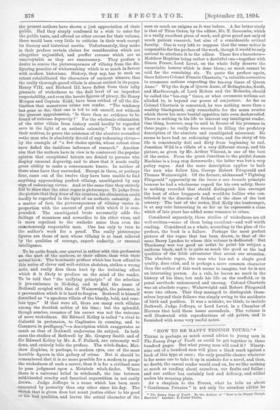STUDIES IN WICKEDNESS.* IT was not so very long ago
that the reading public received from the hands of Dean Burgon a book entitled the Lives of Twelve Good Men, being a series of studies of men whose eminence rested upon a life of virtue. Possibly the title of the one book has suggested the title of another, and the authors of the present volume owe their inspiration to record the lives of twelve eminent scoundrels to the Dean's selection of twelve saints. From one point of view, their inspiration was a happy one. The world, it is to be feared, takes a good deal more interest in the career of the sinner than in that of the upright man, and a tale of extraordinary wickedness is more likely to tickle its ears than a chronicle of virtue. There are people, of course, who would honestly prefer The Lives of the Saints to the Newgate Calendar; but they are rather the exception that proves the rule, and one is fain to admit that
•
Lives of Twelve Bad Men : Oripinat Studies of Eminent Sclowndreta by Voerioui Edited by Thomas Soccombe. London Miller Unwin. the present authors have shown a just appreciation of their public. Had they simply confessed to a wish to cater for the public taste, and offered no other excuse for their volume, there would been very little to criticise in their work except its literary and historical merits. Unfortunately, they make in their preface certain claims for consideration which are altogether unjustified, and proffer excuses which are as unacceptable as they are unnecessary. They profess a desire to rescue the picturesqueness of villainy from the dis- figuring practice of whitewashing which is so much in favour with modern historians. History, they say, has to such an extent rehabilitated the characters of eminent sinners, that the really thorough-paced villain is almost extinct in its pages. Henry VIII. and Richard III. have fallen from their lofty pinnacle of wickedness to the dull level of an imperfect respectability, and even the heroic figures of piracy, Sir Henry Morgan and Captain Kidd, have been robbed of all the die- Unction that monstrous crime can confer. "The tendency has gone so far, that one is led to ask oneself, not without the gravest apprehension, 'Is there then no evidence to be found of extreme depravity?' For the wholesale elimination of the utter villain from history could hardly be regarded save in the light of an ;esthetic calamity." This is one of their motives, to prove the existence of the absolute scoundrel —the man who is absolutely devoid of any redeeming virtue— by the example of "a few choice spirits, whose robust vices have defied the insidious influence of research." Another aim that the authors have in view is to controvert the popular opinion that exceptional talents are denied to persons who display unusual depravity, and to show that it needs really great ability to make a consummate knave, In neither of these aims have they succeeded. Except in three, or perhaps four, cases out of the twelve they have been unable to find anything approaching perfect villainy, unmitigated by any sign of redeeming virtue. And at the same time they entirely fail to show that the utter rogue is picturesque. To judge from the picture that they draw of the creature, his elimination could hardly be regarded in the light of an (esthetic calamity. As a matter of fact, the picturesqueness of villainy varies in proportion with the amount of good with which it is com- pounded. The unmitigated brute necessarily adds the failings of meanness and cowardice to his other vices, and is more repellent to the ;esthetic sense than even the monotonously respectable man. One has only to turn to the author's work for a proof. The really picturesque figures are those of men whose villainy is at least relieved by the qualities of courage, superb audacity, or unusual intelligence.
To be quite frank, our quarrel is rather with this profession on the part of the authors, or their editor, than with their actual book. The bombastic preface which has been affixed to this series of clever and well-written sketches, strikes a wrong note, and really does them hurt by the irritating effect which it is likely to produce on the mind of the reader. To be told that "the unifying principle" of the selection is pre-eminence in ill-doing, and to find the name of Bothwell coupled with that of Wainewright, the poisoner, is a provocation which it is hard to forgive. Bothwell is himself described as "a spacious villain of the bloody, bold, and reso. lute type." If that were all, there are many such villains among the Scottish nobles of his time; but the splendid, though sombre, romance of his career was not the outcome of mere wickedness. Sir Edward Kelley is called "a rival to Galeotti in pretension, to Cagliostro in cunning, and to Casanova in prefiigacy,"—a description which exaggerates as much as that of Bothwell underrates its subject. In both cases the studies of Bothwell by Mr. Gregory Smith and of Sir Edward Kelley by Mr, A. F. Pollard, are extremely well done, and entirely belie the preface. The witch-finder, Mat- thew Hopkins, is perhaps, to modern eyes, one of the most horrible figures in this gallery of crime. But it should be remembered that it is no more possible for a modern to gauge the wickedness of such a career, than it is for a civilised man to pass judgment upon a Matabele witch-finder. Where there is a universal belief in witchcraft, the line between cold-blooded cruelty and fanatical superstition in not easily drawn. Judge Jeffreys is a name which has been more execrated by posterity than any other since his day. The sketch that is given does but scant justice either to his good or his bad qualities, and leaves the actual character of the man as much an enigma as it was before. A far better study is that of Titus Oates, by the editor, Mr. T. Seccombe, which is a really excellent piece of work, and gives proof not only of much patient research, but also of a considerable critical faculty. One is very loth to suppose that the same writer is responsible for the preface of the work, though it would be only natural to attribute it to the editor. These five c haracters- Matthew Hopkins being rather a doubtful one—together with Simon Fraser, Lord Lovat, on the whole fully deserve the unenviable honour which is done them; as much cannot be said for the remaining six. To quote the preface again, there follows Colonel Francis Charteris, "a valuable corrective to erroneous notions respecting the tea-cup times of Queen Anne." Why the days of Queen Anne, of Bolingbroke, Swift, and Marlborough, of Lord Mohun and the Mohocks, should be called the "tea-cup " times, or what erroneous notions are alluded to, is beyond our power of conjecture. As far as Colonel Charteris is concerned, he was nothing more than a. wealthy blackguard, only remarkable for the mean avarice which threw his more bestial appetites into even darker relief. There is nothing in his life to interest any intelligent reader. One thing, however, may be said in favour of his presence in these pages ; he really does succeed in filling the prefatory description of the absolute and unmitigated miscreant. He seems to have had no redeeming virtue, and the story of his life is consistently dull and dirty from beginning to end. Jonathan Wild is a villain of a very different stamp, and his picture, as given by Mr. Arthur Vincent, is one of the best of the series. From the great Jonathan to the pitiful James Maclaine is a long step downwards ; the latter was but a very paltry rogue. And the same description applies to both the men who follow him, George Robert Fitzgerald and Thomas Wainewright. Of the former, nicknamed " Fighting Fitzgerald " apparently on the Nees a non lucenclo principle because he had a wholesome regard for his own safety, there is nothing recorded that should distinguish him amongst the host of other braggarts and would-be bullies who con- tributed to the disorder of Ireland at the close of the last century. The last of the series, Ned Kelly the bushranger, is at any rate interesting in so far as he represents a class which of late years has added some romance to crime.
Considered separately, these studies of wickedness are all well-written—some of them being excellent—and well worth reading. Considered as a whole, according to the plan of the preface, the book is a failure. Perhaps the moat perfect picture of the rogue that has been drawn, is that of the same Barry Lyndon to whom this volume is dedicated. But Thackeray was too good an artist to paint his subject a uniform black, and it is quite as much the good as the qualities of the Irish adventurer that arrest our attention. The absolute rogue, the man who has not a single good quality, does exist, and is perhaps a more common character than the author of this work seems to imagine, but he is not an interesting person. As a rule, he leaves no mark in the history of his time, but ends his life on the scaffold, or in penal servitude unhonoured and unsung. Colonel Charteris was an absolute rogue ; Wainewright and Robert Fitzgerald were two others. That they managed to distinguish them. selves beyond their fellows was simply owing to the accidents of birth and position. It was a mistake, we think, to include Bothwell, Judge Jeffreys, or Lord Lovat, in a Chamber of Borrora that held these lesser scoundrels. The volume is well illustrated with reproductions of old prints, and is furnished with some very useful notes.



































 Previous page
Previous page